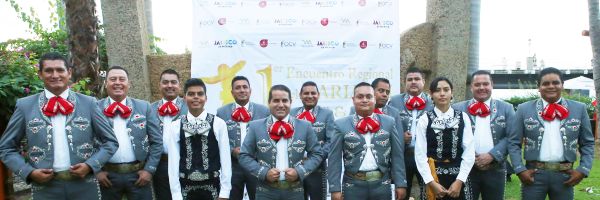Puerto Vallarta, Jalisco, Mexico - In celebration of El Día Estatal de Mariachi, Puerto Vallarta will host the 1st Children and Youth Mariachi Regional Encounter on November 26th and 27th, 2016.
In the interest of promoting Jalisco's culture and traditions, the municipal government, headed by Mayor Arturo Dávalos Peña, is the driving force behind the gathering, which will feature three youth Mariachi groups from Puerto Vallarta, one from Cocula and another from Tomatlán.
In a press conference, event organizer Rocío Alamillo Flores said that 'The Most Mexican Port' will dress festively for the State's Mariachi Day, which is celebrated every year on November 27, by declaration of the State Congress Of Jalisco.
 |
The stars of the show will be the five groups of Mariachi whose members are between 8 and 17 years old, all with academic and artistic training of Mariachi music in their places of origin.
Cultural Director Armando Soltero Macía said that Mayor Arturo Dávalos has instructed the city council to support the Instituto Vallartense de Cultura, directed by Luis Fernando Sánchez, in the diffusion of all of the different aspects of Mexican culture - and above all to everything that has contributed to the identity of Jalisco, which in this case is the Mariachi.
The group representing Cocula, (called "The Cradle of Mariachi," given that Mariachi music originated there in the 19th century,) will perform on Saturday the 26th in Marina Vallarta, where an "Origin of Mariachi Music" conference, led by the Maestro Steven Sandoval, and music workshops for children will be held on Sunday.
There will also be Mariachi presentations in Plaza Caracol and at Galleries Vallarta on Sunday morning, at Lázaro Cárdenas Park on Sunday afternoon from 4-7 pm, and at the Lighthouse stage on the Malecón that same evening. Later, the festivities will close with a magnificent concert that opens with a performance by the Puerto Vallarta Youth Orchestra and feature all of the Children and Youth Mariachi groups at Los Arcos Amphitheater.
Original article translated and edited by María Francesca for BanderasNews.com.
What is Mariachi?
 |
The wide repertoire includes songs from different regions, jarabes, minuets, polkas, valonas, schottisches, waltzes and serenades, in addition to corridos (typical Mexican ballads narrating stories of battles, outstanding deeds and love affairs) and traditional songs depicting rural life. Modern Mariachi music has adopted other genres such as ranchera songs, the bolero ranchero and even the Cumbia from Colombia.
The lyrics of Mariachi songs portray love of the earth, hometown, native land, religion, nature, fellow countrywomen and the strength of the country.
Learning by ear is the main means of transmission of traditional Mariachi, and the skill is usually passed down from fathers to sons and through performance at festive, religious and civil events.
Mariachi music transmits values of respect for the natural heritage of the regions of Mexico and local history in the Spanish language and Indian languages of Western Mexico.
Source: unesco.org


